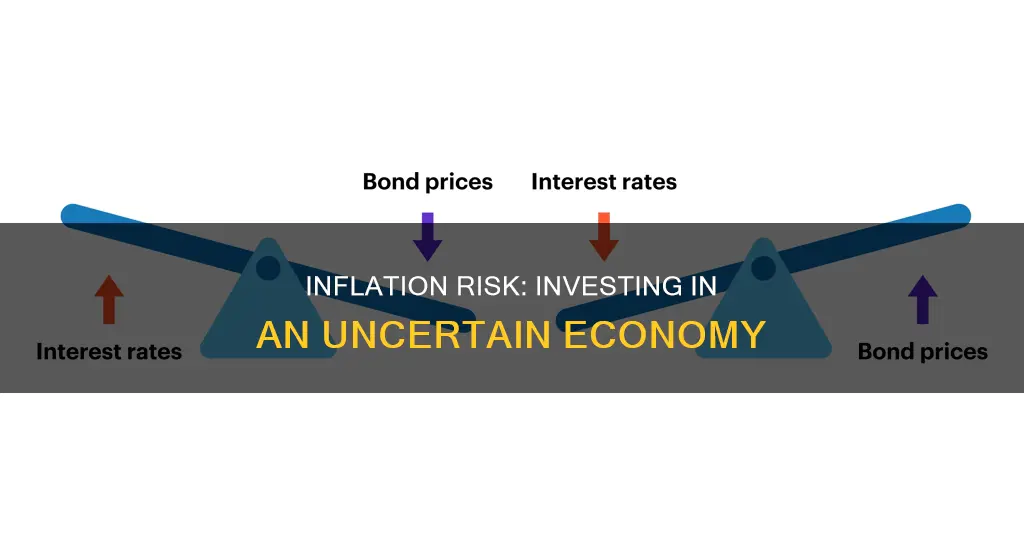
Inflation is a significant concern for investors, as it can reduce the value of investments over time. Inflation risk refers to the possibility that the inflation rate will exceed the rate of return on an investment, leading to a decrease in the purchasing power of the investment's returns. This occurs because inflation causes money to be worth less over time, as the average cost of goods and services increases. As a result, investors may find that their investments are losing money, even if they gain in dollar value. To mitigate this risk, investors should aim for returns that are equal to or greater than the inflation rate. Diversification across asset classes and investing in inflation-protected securities, such as index-linked bonds or Treasury Inflation-Protected Securities (TIPS), can also help protect against inflation. Understanding the relationship between inflation and investments is crucial for making informed investment decisions.
| Characteristics | Values |
|---|---|
| Definition of inflation | The lessening of money's purchasing power in an economy |
| How inflation affects the economy | Inflation leads to a decrease in purchasing power, causing a slowdown in economic activity |
| Factors influencing inflation | Increased demand, increased production costs, monetary policy, consumer expectation |
| Impact of inflation on savings | Inflation can shrink savings, even in accounts with average interest rates |
| Impact of inflation on investment returns | Inflation erodes the value of fixed investment returns; investors need to earn at least the inflation rate to maintain their standard of living |
| Impact of inflation on stocks | Inflation can negatively affect nominal returns; growth stocks tend to decline in price during high inflation |
| Impact of inflation on real assets | Commodities and real estate tend to have a positive relationship with inflation |
| Hedging against inflation | Commodities, index-linked bonds, REITs, ETFs, physical real estate, gold |
| Impact of inflation on fixed-income investments | Inflation reduces the real returns on corporate or municipal bonds, treasuries, and CDs |
What You'll Learn
- Inflation erodes the value of savings, especially those with a fixed payout
- Inflation can hurt the performance of investments with a set annual return
- Inflation impacts stocks differently depending on the performance of the company
- Inflation can be mitigated by investing in commodities such as oil, agricultural goods, and precious metals
- Inflation-indexed investments like TIPS bonds can provide returns that adjust for inflation changes

Inflation erodes the value of savings, especially those with a fixed payout
Inflation is a sustained increase in the price of goods and services over time, which leads to a decrease in purchasing power. In other words, when inflation occurs, your money buys less. This is problematic for investments, as it erodes the value of savings, especially those with a fixed payout.
Inflation erodes the value of savings by reducing the purchasing power of money over time. This means that a sum of money will not go as far in the future as it does today. For example, if you have $10,000 in savings, that money may not be able to buy as much in 20 years' time due to inflation. While you won't have technically lost money, your net worth will be smaller as your purchasing power will have decreased.
Inflation particularly affects savings with a fixed payout, such as regular bonds or bank certificates of deposit. This is because the interest payments or coupon amounts remain the same, while the purchasing power of those payments declines as inflation rises. This results in a lower real rate of return. For example, if you invest in a one-year bond with a 5% nominal interest rate, but the inflation rate is 3%, your real rate of return is only 2%.
Inflation can also affect the value of savings in a bank account, even if you are earning interest. While banks typically pay higher interest rates during periods of high inflation, your savings may not grow fast enough to offset the loss in purchasing power.
To protect against inflation, investors should consider diversifying their portfolios to include assets that may appreciate with inflation, such as stocks, precious metals, and commodities. Inflation-indexed investments like Treasury Inflation-Protected Securities (TIPS) can also provide returns that adjust for inflation changes. By investing in a range of assets, investors can help ensure that their savings retain their value over time, even in the face of inflation.
Speculative Investments: High-Risk, High-Reward Opportunities?
You may want to see also

Inflation can hurt the performance of investments with a set annual return
For example, if you receive an annual payment of $100 from an investment with a set return, this payment becomes worth relatively less each year given the effects of inflation. The higher the rate of inflation, the more significant the decrease in the purchasing power of the investment returns. This can lead to a situation where the investment returns do not keep up with the rising cost of living, resulting in a loss of wealth.
Inflation also affects the returns on fixed-income investments, such as bonds, which offer a stable income stream through regular interest payments. However, as inflation rises, the purchasing power of these interest payments declines, resulting in a lower real return for the investor. For instance, consider a bond with a $1,000 face value and a 5% nominal interest rate. If the inflation rate is 3%, the investor's real rate of return is only 2%, reducing the real value of the returned principal investment.
Furthermore, inflation can negatively impact the performance of stocks. While a strong economy typically leads to higher inflation, companies also have to pay more for wages and raw materials, which can hurt their value. Therefore, whether inflation will help or hurt a stock depends on the individual company's performance and its ability to increase prices to match rising costs.
To mitigate the impact of inflation on investments with set annual returns, investors can consider diversifying their portfolios by including assets that have the potential to appreciate with inflation, such as stocks, precious metals, and commodities. Inflation-indexed investments, such as Treasury Inflation-Protected Securities (TIPS), can also provide returns that adjust for inflation changes, helping to maintain the purchasing power of the investment.
Inventories Management and Inter-corporate Investments: Strategies for Success
You may want to see also

Inflation impacts stocks differently depending on the performance of the company
Impact on Stock Prices
Inflation can affect stock prices differently depending on the strength of the business. Some companies can absorb or pass on price increases to consumers, while others cannot. Large-cap stocks, for example, generally have stronger pricing power due to brand recognition and loyalty, making it easier for them to pass on cost increases to consumers without impacting demand. On the other hand, small-cap stocks tend to have less financial leverage and pricing power. Inflation can put companies in a difficult position as they have to decide when and by how much to raise prices, or risk sacrificing profit margins by maintaining prices.
Investor Sentiment
Higher inflation leads to higher interest rates, which negatively impacts stock valuations regardless of a company's profits and operational performance. This creates uncertainty among investors, causing stock prices to fluctuate. Moderate inflation, on the other hand, is usually associated with higher investor confidence due to stable and predictable economic growth.
Market Volatility
The uncertainty surrounding which companies can navigate higher inflation and overall investor sentiment leads to market volatility and unpredictability. Investors may rotate between market sectors, selling off stocks of companies vulnerable to higher costs and moving towards those seen as inflation-resistant, typically large-cap stocks and short-term bonds. This creates more frequent and abrupt changes in stock prices, causing the market to fluctuate.
Sector Performance
Inflation's effects vary across stock market sectors. Real estate and energy sectors, for instance, can more easily pass on price increases as their goods are considered necessities. Precious metals like gold are also a common hedge against inflation as they maintain their value. In contrast, consumer discretionary sectors like retail and autos have faced challenges due to reduced demand. Manufacturing and transportation sectors, which rely heavily on raw materials, struggle to pass on costs to consumers without losing sales.
Stock Performance
The performance of stocks also varies during inflationary periods. Value stocks, which are companies that investors believe are undervalued by the market, tend to perform better during high inflation. Growth stocks, on the other hand, which are expected to deliver above-average returns, typically perform better during low inflation or stable economic conditions.
A Guide to Investing in European Equities
You may want to see also

Inflation can be mitigated by investing in commodities such as oil, agricultural goods, and precious metals
Inflation is a general rise in prices and fall in the purchasing value of money. It is an economy-wide, sustained trend of increasing prices from one year to the next. As inflation occurs, the value of money decreases, and purchasing power declines. This means that the same amount of money will buy fewer goods and services.
Commodities are a broad category that includes grain, precious metals, electricity, oil, beef, orange juice, and natural gas, as well as foreign currencies, emissions, and certain other financial instruments. Commodities are produced or extracted products, often natural resources or agricultural goods, that are used as inputs in other processes. They are uniform in quality and utility regardless of their source.
Commodities are a good hedge against inflation as their prices tend to rise when inflation is accelerating. This is because, as the demand for goods and services increases, the price of the commodities used to produce those goods and services also increases.
- Direct investment in precious metals: Gold, silver, and platinum are valued for their intrinsic worth and historical performance during periods of economic volatility. These metals hold their value over time, providing a counterbalance during periods of currency devaluation and economic uncertainty. Physical investments in precious metals can be in the form of coins or bars. Coins may be exempt from capital gains tax (CGT) and VAT for some countries. Bars may be appealing for bulk investments without the purchase premium that may come with coins. However, physical metals require considerations like storage and insurance.
- Digital precious metals: Digital precious metals are a modern approach to traditional investments, offering the benefits of owning precious metals without the physical storage requirements. They are backed by metal holdings but allow for greater flexibility in trading and management, and eliminate concerns around the security and insurance of physical holdings.
- Exchange-traded commodities (ETCs): ETCs that specialize in precious metals offer exposure to the market without directly owning and safeguarding physical assets. Investors can buy and sell shares in a precious metals ETC through a brokerage account, allowing for easy diversification and spread of risk within a portfolio.
- Investing in commodities via exchange-traded funds (ETFs): ETFs like the iShares S&P GSCI Commodity-Indexed Trust (GSG) allow investors to broadly invest in commodities.
- Investing in oil: Oil is a commodity that falls under the "energy products" category of commodities. As a hard commodity, it requires drilling and is often classified as a natural resource. Oil prices tend to rise with inflation, and investing in oil can provide a hedge against inflation.
- Investing in agricultural goods: Agricultural goods are classified as "soft commodities", which are grown or ranched. Examples include corn, wheat, soybeans, and cattle. As with other commodities, the prices of agricultural goods tend to rise with inflation, making them a potential hedge against inflation.
By investing in commodities such as oil, agricultural goods, and precious metals, investors can protect their portfolios from the eroding effects of inflation.
Monetary Policy: Investing and Saving Explained
You may want to see also

Inflation-indexed investments like TIPS bonds can provide returns that adjust for inflation changes
Inflation is the rise in the average cost of goods and services over time, which leads to a decrease in purchasing power. This means that investors need to ensure their investments are keeping pace with inflation, or they will be losing money in real terms. Inflation-indexed investments like Treasury Inflation-Protected Securities (TIPS) are designed to provide returns that adjust for inflation changes, protecting investors from a decline in the purchasing power of their money.
TIPS are a type of Treasury bond issued by the US government. The face value of TIPS is pegged to the Consumer Price Index (CPI) and adjusted in line with changes in the rate of inflation. The US Treasury then pays interest on the adjusted face value of the bond, so that the interest payments increase as inflation rises. TIPS are considered a low-risk investment because they are backed by the US government.
The principal value of TIPS rises as inflation rises, while the interest payment varies with the adjusted principal value of the bond. TIPS pay interest every six months based on a fixed rate determined at the bond's auction. However, the interest payment amounts can vary since the rate is applied to the adjusted principal or value of the bond. If the principal amount is adjusted higher over time due to rising prices, then the interest rate will be multiplied by the increased principal amount, resulting in higher interest or coupon payments as inflation rises. Conversely, investors will receive lower interest payments if deflation occurs.
TIPS can be purchased directly from the US government through the TreasuryDirect system, in $100 increments with a minimum investment of $100, and are available with maturities of five, 10, and 30 years. They can also be purchased through a TIPS mutual fund or exchange-traded fund (ETF).
TIPS can be a valuable tool for investors seeking to protect their portfolios from the negative effects of inflation. They offer a "real" rate of return, which takes into account inflation, as opposed to the "nominal" return of traditional bonds, which does not account for inflation. By investing in TIPS, investors can ensure that their investment returns keep pace with inflation, maintaining their purchasing power over time.
Unlocking Private Equity Investment: A Guide to Getting Started
You may want to see also
Frequently asked questions
Inflation risk is the possibility that the inflation rate will surpass the rate of return on an investment, resulting in a decrease in the purchasing power of the investment's returns.
Inflation can eat away at your investment returns, especially for investments with a fixed annual return, like regular bonds or bank certificates of deposit.
Inflation can have a mixed impact on stocks. On the one hand, a strong economy typically leads to higher inflation, which may boost companies' sales and share prices. On the other hand, companies also face increased costs for wages and raw materials, which can hurt their value.
Yes, some investments that have historically protected against inflation include commodities, index-linked bonds, REITs (real estate investment trusts), and a well-diversified shares portfolio over the long term.
It's important to diversify your portfolio across asset classes and consider inflation risk. Some investments that can help protect against inflation include stocks, precious metals, and inflation-indexed investments like Treasury Inflation-Protected Securities (TIPS).







